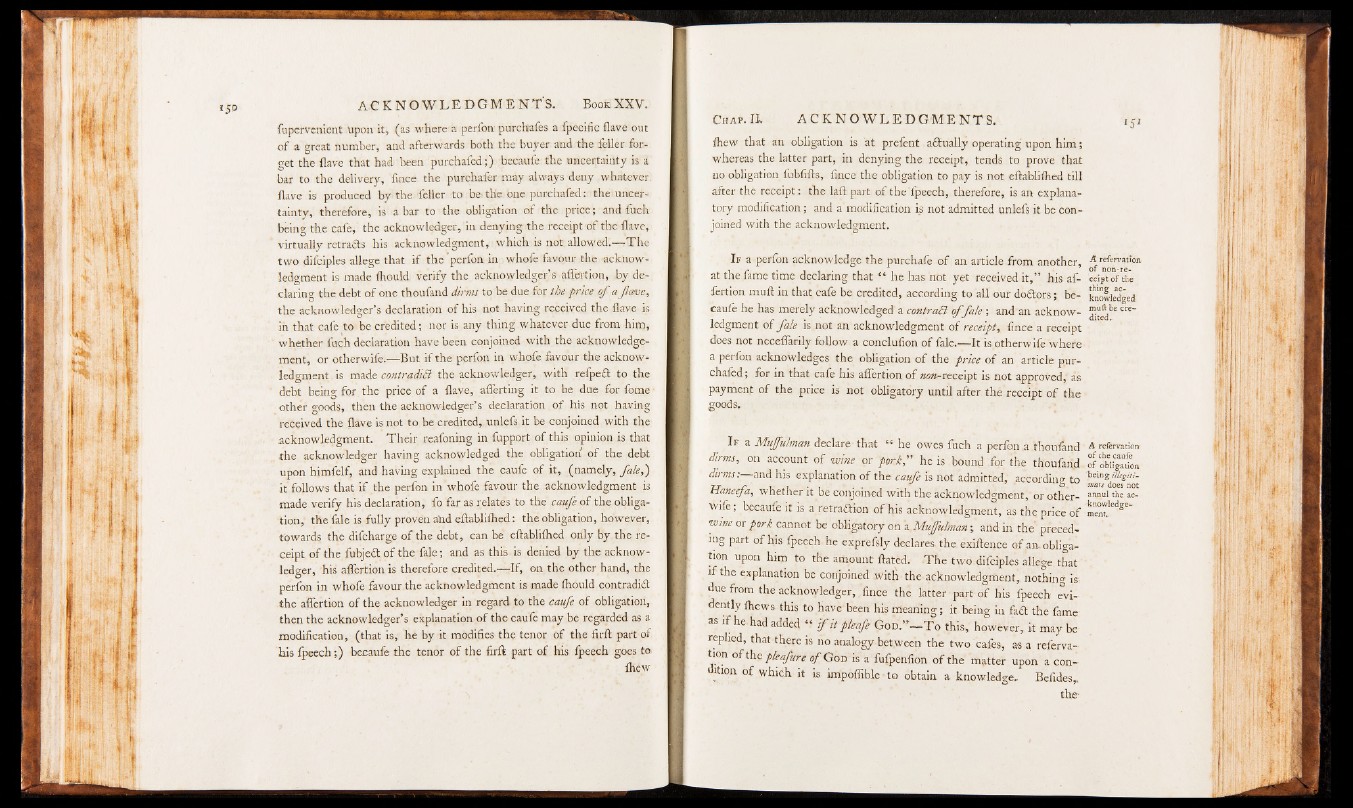
fupervenient upon it, (as where a perfon purchafes a fpecifie flave out
o f a great number, and afterwards both the buyer and the feller forget
the flave that had been purchafed;) becaufe the uncertainty is a
bar to the delivery, fince the purchafer may always deny ..whatever,
flave is produced by the feller, to be. the one purchafed: themneer-
tainty, therefore, is a bar to the obligation of the price; and fuch
being the cafe,' the acknowledger, in denying the receipt of the flave,
virtually retra&s his acknowledgment, which is not allowed!—^The
two difciples allege that if the'perfon in whofe favour the -acknowledgment
is made fhould verify the acknowledger’s aftdrtion, byde-,
daring the debt of one thoufand dirms to be due for the price g f a Jlave,
the acknowledger’s declaration of his not having received the flave is
in that cafe to be credited; nor is any thing whatever due from him,
whether fuch declaration have been conjoined with the acknowledgement,
or otherwife.— But if the perfon in whofe favour the acknowledgment
is made contradiEt the acknowledger, with refpeft to the
debt being for the price of a flave, aflerting it to be due for fome
other goods, then the acknowledger’ s declaration of his not having
received the flave is not to be credited, unlefs it be conjoined with the
acknowledgment. Their reafoning in fupport of this opinion is that
the acknowledger having acknowledged the obligation of the debt
upon himfelf, and having explained the caufe of it, (namely, fate,')
it follows that i f the perfon in whofe favour the acknowledgment is
made verify his declaration, fo far as relates to the caufe of the obligation,
the fale is fully proven a"nd eftablilhed: the obligation, however,
towards the difeharge of the debt, can be eftablilhed only by the receipt
of the fubjedt of the fale; and as this is denied by the acknowledger.
his affertion is therefore credited.— If,O ’ , on the other hand, the
perfon in whofe favour.the acknowledgment is made fhould contradift
the afiertion of the acknowledger in regard to the caufe of obligation,
then the acknowledger’s explanation of the caufe may be regarded as a
modification, (that is, he by it modifies the tenor of the firft part of
his fpeech;) becaufe the tenor of the firft part of his fpeech goes to
fhew
fhew that an obligation is at prefent actually operating upon him;
whereas the latter part, in denying the receipt, tends to prove that
no obligation fubfifts, fince the obligation to pay is not eftablilhed till
after the receipt: the laft part of the'fpeech, therefore, is an explanatory
modification; and a modification is not admitted unlefs it be conjoined
with the acknowledgment.
If a perfon acknowledge the purchafe of an article from another,
at the fame time declaring that “ he has not yet received it,” his affertion
muft in that cafe be credited, according to all our doctors; becaufe
he has merely acknowledged' a contraEl o f fale \ and an acknowledgment
of fale is not an acknowledgment of receipt,, fince a receipt
does not neceflarily follow a conclufion of fale.—It is otherwife where
a perfon acknowledges the obligation of the price of an article purchafed;
for in that cafe his afiertion of non-receipt is not approved,^ as
payment of the price is not obligatory until after the receipt of the
goods.
If a Muffulman declare that “ he owes fuch a perfon a thoufand A refervation
dirms, on account of wine or pork," he is bound .for the thoufand-. of
dirms: and his explanation of the caufe is not admitted, according to 'beinSm m
77- r r- ,1 . , . . . . t , G. mate does not
tianeeja, whether it be conjoined with the acknowledgment, or other- anr?u^the ac*
wife; becaufe it is a retra&ion of his acknowledgment, as the price of meatT®*’’
wine or pork cannot be obligatory on a.Muffulman; and in the preced-
ing part of his-fpeech he exprefely declares, the. exiftence of an* obligation
upon him to the amount ftated. The two difciples allege that
if the explanation be conjoined with the- acknowledgment, nothing is.
due from the acknowledger, fince the latter part of his fpeech evidently
fhews this to have-been his meaning; it being in fa<ft the feme
as if he had added “ i f it pleafe G od.” — T o this, however, it may be
replied, that there is no analogy between the two cafes, as a referva-
tion o f the pleafure o f G od is a fufpenfion of the matter upon a condition
of which it is impoffible to obtain a knowledge, Befides,,
the-
A reservation
of non-receipt
of the
thing acknowledged
muft be credited.